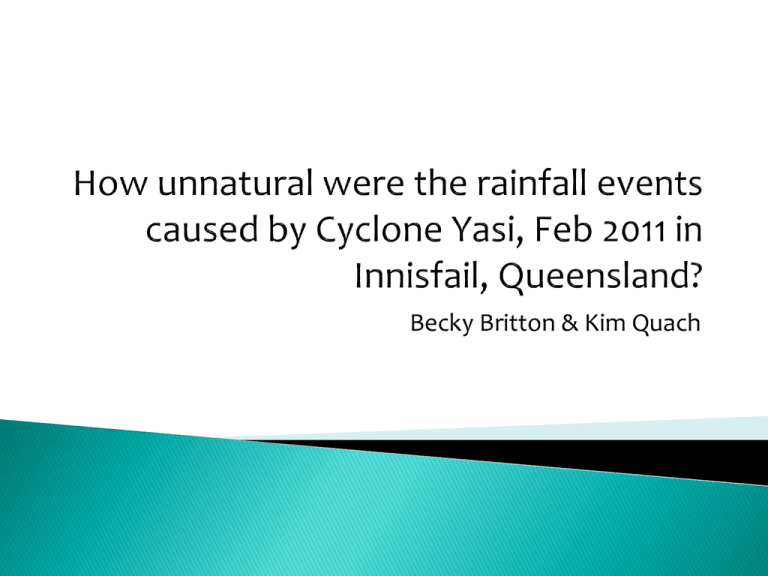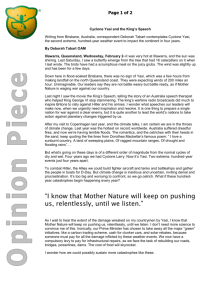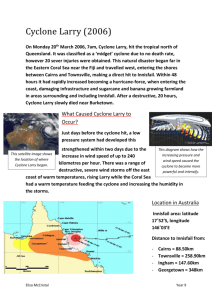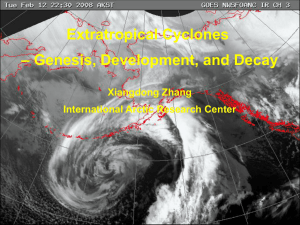How unnatural were the rainfall events caused by Cyclone Yasi, Feb
advertisement

Becky Britton & Kim Quach Cyclone Yasi Cyclone Yasi began as a tropical low to the northwest of Fiji, on the 29th January 2011 and began directing westward toward Australia Cyclone Yasi hit the North-East coast of Queensland in the early morning of February 3rd 2011, where it also became a category 5 cyclone. Yasi Targeted many cities along the coast and slightly inland, Innisfail being one of the many. The cyclone finally weakened at around 10:00PM near Mount Isa on the 3rd February 2011 . Yasi is one of the most disastrous and powerful cyclones ever to have hit Queensland since records began, as evident in the astounding impact it made to Innisfail’s rainfall in early February 2011 We have based our research on the information of http://www.bom.gov.au/climate/data/ Voronoi Graph Development We decided to use the method of a Voronoi Graph, or Thiessen Polygon as referred to with climate, to display our research We found a map of our region where the cyclone hit (Innisfail) to base our graph upon All the nearest rainfall gauges to our region were located and connected to their nearest neighbouring gauges, forming triangular figures We then identified the half way point of each line and drew a perpendicular line through The perpendicular bisectors were constructed and joined to form our regions Voronoi Graph Completed Russel River Nerada Alert Daradgee Tung Oil Alert Corsis Alert Innisfail Marco Street Alert Central Mill TM Mean of Feb 2011: 32.46ml Median of Feb 2011: 7.5ml South Johnstone Exp Stn Jan 15 – Feb 15 2011, Innisfail QLD 200 180 160 Millilitres 140 120 100 80 The horizontal blue lines across the graph display the mean and median rainfall measurements of the Innisfail Queensland water gauge from Jan 15 – Feb 15 2011 These graphs present the numerical values we gathered from www.bom.gov.au We can observe that Cyclone Yasi hit Innisfail around the time of Feb 3rd and 4th and we can see the unnatural impact it caused toward Innisfail’s rainfall levels. 60 40 Mean 20 Median 0 Jan Jan Jan Jan Jan Jan Jan Jan Jan Feb Feb Feb Feb Feb Feb Feb 15th 17th 19th 21st 23rd 25th 27th 29th 31st 2nd 4th 6th 8th 10th 12th 14th Daily Rainfall February Rainfalls, Innisfail QLD 1200 1000 Millilitres 800 In the past 13 years, 2011, the year of Cyclone Yasi, holds the third highest level of February rainfall. Innisfail has also experienced such occasions before, as seen in 2007 and 2009. 600 400 200 0 2001 2002 2003 2004 2005 2006 2007 2008 2009 2010 2011 2012 2013 February Total Monthly Rainfalls, Innisfail QLD 1000 900 800 Millilitres 700 This graph compares the total, mean and median rainfall of each month over the time period of 2000-2013. The total rainfall levels are the sum of all the measurements, the mean being the average and the median, the middle of the results. 2011 definitely stands out in terms of rainfall data. The levels of February and March towering over the means and medians of the past 13 years. Cyclone Yasi greatly affected Innisfail's rainfall. 600 500 400 300 200 100 0 Jan Feb Mar Apr May Jun Monthly Total 2011 Jul Aug Sep Oct Nov Dec Mean 2000-2013 Median 2000-2013 Conclusion From the statistics gathered, we can come to a decision that Cyclone Yasi had created a significant alter in the rainfall standards of Innisfail Queensland, February 2011 In contrast to the days (slide 4), months (slide 5), and years (slide 6), Cyclone Yasi has greatly impacted the results, which is evident in the surges it has caused From mid January - mid February 2011, the rainfall levels ranged from 0 – 193ml of rain. The 3rd of February 2011 being the highest peak, also a day within the time of Cyclone Yasi Out of all the February’s of 2000 – 2013, the results ranging from 107 - 1134, February 2011, with 909ml of rain, having the third most level of rainfall. And of the months of 2000 – 2013, the results range from 31 – 980ml. The second highest point of 909ml being February 2011, the month of Cyclone Yasi and the month of the second most highest level of rainfall out of the 156 months from 2000 – 2013 Cyclone Yasi: highest rainfall of mid Januray – mid February 2011 (1st out of 30 days), third highest of all February’s of 2000 – 2013 (3rd out of 12) and the second highest rainfall of all months from 2000 – 2013 (2nd out of 156) Reference: Climate Data Online. 2013. Climate Data Online. [ONLINE] Available at: http://www.bom.gov.au/climate/data/. [Accessed 05 September 2013]











